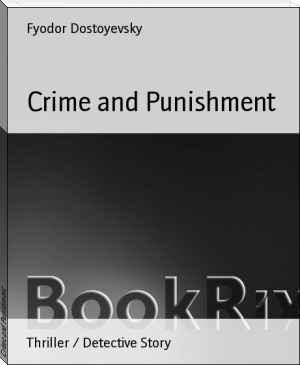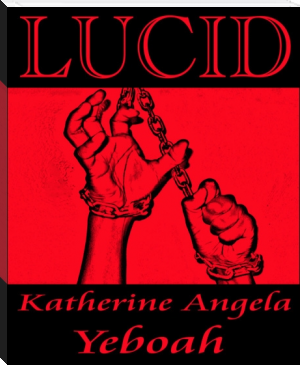Crime and Punishment by Fyodor Dostoyevsky (classic literature list .TXT) 📖

- Author: Fyodor Dostoyevsky
Book online «Crime and Punishment by Fyodor Dostoyevsky (classic literature list .TXT) 📖». Author Fyodor Dostoyevsky
"Then you believe in the New Jerusalem, do you?"
"I do," Raskolnikov answered firmly; as he said these words and during the whole preceding tirade he kept his eyes on one spot on the carpet.
"And... and do you believe in God? Excuse my curiosity."
"I do," repeated Raskolnikov, raising his eyes to Porfiry.
"And... do you believe in Lazarus' rising from the dead?"
"I... I do. Why do you ask all this?"
"You believe it literally?"
"Literally."
"You don't say so.... I asked from curiosity. Excuse me. But let us go back to the question; they are not always executed. Some, on the contrary..."
"Triumph in their lifetime? Oh, yes, some attain their ends in this life, and then..."
"They begin executing other people?"
"If it's necessary; indeed, for the most part they do. Your remark is very witty."
"Thank you. But tell me this: how do you distinguish those extraordinary people from the ordinary ones? Are there signs at their birth? I feel there ought to be more exactitude, more external definition. Excuse the natural anxiety of a practical law-abiding citizen, but couldn't they adopt a special uniform, for instance, couldn't they wear something, be branded in some way? For you know if confusion arises and a member of one category imagines that he belongs to the other, begins to 'eliminate obstacles' as you so happily expressed it, then..."
"Oh, that very often happens! That remark is wittier than the other."
"Thank you."
"No reason to; but take note that the mistake can only arise in the first category, that is among the ordinary people (as I perhaps unfortunately called them). In spite of their predisposition to obedience very many of them, through a playfulness of nature, sometimes vouchsafed even to the cow, like to imagine themselves advanced people, 'destroyers,' and to push themselves into the 'new movement,' and this quite sincerely. Meanwhile the really _new_ people are very often unobserved by them, or even despised as reactionaries of grovelling tendencies. But I don't think there is any considerable danger here, and you really need not be uneasy for they never go very far. Of course, they might have a thrashing sometimes for letting their fancy run away with them and to teach them their place, but no more; in fact, even this isn't necessary as they castigate themselves, for they are very conscientious: some perform this service for one another and others chastise themselves with their own hands.... They will impose various public acts of penitence upon themselves with a beautiful and edifying effect; in fact you've nothing to be uneasy about.... It's a law of nature."
"Well, you have certainly set my mind more at rest on that score; but there's another thing worries me. Tell me, please, are there many people who have the right to kill others, these extraordinary people? I am ready to bow down to them, of course, but you must admit it's alarming if there are a great many of them, eh?"
"Oh, you needn't worry about that either," Raskolnikov went on in the same tone. "People with new ideas, people with the faintest capacity for saying something _new_, are extremely few in number, extraordinarily so in fact. One thing only is clear, that the appearance of all these grades and sub-divisions of men must follow with unfailing regularity some law of nature. That law, of course, is unknown at present, but I am convinced that it exists, and one day may become known. The vast mass of mankind is mere material, and only exists in order by some great effort, by some mysterious process, by means of some crossing of races and stocks, to bring into the world at last perhaps one man out of a thousand with a spark of independence. One in ten thousand perhaps--I speak roughly, approximately--is born with some independence, and with still greater independence one in a hundred thousand. The man of genius is one of millions, and the great geniuses, the crown of humanity, appear on earth perhaps one in many thousand millions. In fact I have not peeped into the retort in which all this takes place. But there certainly is and must be a definite law, it cannot be a matter of chance."
"Why, are you both joking?" Razumihin cried at last. "There you sit, making fun of one another. Are you serious, Rodya?"
Raskolnikov raised his pale and almost mournful face and made no reply. And the unconcealed, persistent, nervous, and _discourteous_ sarcasm of Porfiry seemed strange to Razumihin beside that quiet and mournful face.
"Well, brother, if you are really serious... You are right, of course, in saying that it's not new, that it's like what we've read and heard a thousand times already; but what is really original in all this, and is exclusively your own, to my horror, is that you sanction bloodshed _in the name of conscience_, and, excuse my saying so, with such fanaticism.... That, I take it, is the point of your article. But that sanction of bloodshed _by conscience_ is to my mind... more terrible than the official, legal sanction of bloodshed...."
"You are quite right, it is more terrible," Porfiry agreed.
"Yes, you must have exaggerated! There is some mistake, I shall read it. You can't think that! I shall read it."
"All that is not in the article, there's only a hint of it," said Raskolnikov.
"Yes, yes." Porfiry couldn't sit still. "Your attitude to crime is pretty clear to me now, but... excuse me for my impertinence (I am really ashamed to be worrying you like this), you see, you've removed my anxiety as to the two grades getting mixed, but... there are various practical possibilities that make me uneasy! What if some man or youth imagines that he is a Lycurgus or Mahomet--a future one of course--and suppose he begins to remove all obstacles.... He has some great enterprise before him and needs money for it... and tries to get it... do you see?"
Zametov gave a sudden guffaw in his corner. Raskolnikov did not even raise his eyes to him.
"I must admit," he went on calmly, "that such cases certainly must arise. The vain and foolish are particularly apt to fall into that snare; young people especially."
"Yes, you see. Well then?"
"What then?" Raskolnikov smiled in reply; "that's not my fault. So it is and so it always will be. He said just now (he nodded at Razumihin) that I sanction bloodshed. Society is too well protected by prisons, banishment, criminal investigators, penal servitude. There's no need to be uneasy. You have but to catch the thief."
"And what if we do catch him?"
"Then he gets what he deserves."
"You are certainly logical. But what of his conscience?"
"Why do you care about that?"
"Simply from humanity."
"If he has a conscience he will suffer for his mistake. That will be his punishment--as well as the prison."
"But the real geniuses," asked Razumihin frowning, "those who have the right to murder? Oughtn't they to suffer at all even for the blood they've shed?"
"Why the word _ought_? It's not a matter of permission or prohibition. He will suffer if he is sorry for his victim. Pain and suffering are always inevitable for a large intelligence and a deep heart. The really great men must, I think, have great sadness on earth," he added dreamily, not in the tone of the conversation.
He raised his eyes, looked earnestly at them all, smiled, and took his cap. He was too quiet by comparison with his manner at his entrance, and he felt this. Everyone got up.
"Well, you may abuse me, be angry with me if you like," Porfiry Petrovitch began again, "but I can't resist. Allow me one little question (I know I am troubling you). There is just one little notion I want to express, simply that I may not forget it."
"Very good, tell me your little notion," Raskolnikov stood waiting, pale and grave before him.
"Well, you see... I really don't know how to express it properly.... It's a playful, psychological idea.... When you were writing your article, surely you couldn't have helped, he-he! fancying yourself... just a little, an 'extraordinary' man, uttering a _new word_ in your sense.... That's so, isn't it?"
"Quite possibly," Raskolnikov answered contemptuously.
Razumihin made a movement.
"And, if so, could you bring yourself in case of worldly difficulties and hardship or for some service to humanity--to overstep obstacles?... For instance, to rob and murder?"
And again he winked with his left eye, and laughed noiselessly just as before.
"If I did I certainly should not tell you," Raskolnikov answered with defiant and haughty contempt.
"No, I was only interested on account of your article, from a literary point of view..."
"Foo! how obvious and insolent that is!" Raskolnikov thought with repulsion.
"Allow me to observe," he answered dryly, "that I don't consider myself a Mahomet or a Napoleon, nor any personage of that kind, and not being one of them I cannot tell you how I should act."
"Oh, come, don't we all think ourselves Napoleons now in Russia?" Porfiry Petrovitch said with alarming familiarity.
Something peculiar betrayed itself in the very intonation of his voice.
"Perhaps it was one of these future Napoleons who did for Alyona Ivanovna last week?" Zametov blurted out from the corner.
Raskolnikov did not speak, but looked firmly and intently at Porfiry. Razumihin was scowling gloomily. He seemed before this to be noticing something. He looked angrily around. There was a minute of gloomy silence. Raskolnikov turned to go.
"Are you going already?" Porfiry said amiably, holding out his hand with excessive politeness. "Very, very glad of your acquaintance. As for your request, have no uneasiness, write just as I told you, or, better still, come to me there yourself in a day or two... to-morrow, indeed. I shall be there at eleven o'clock for certain. We'll arrange it all; we'll have a talk. As one of the last to be
 However, all readers - sooner or later - find for themselves a literary genre that is fundamentally different from all others.
However, all readers - sooner or later - find for themselves a literary genre that is fundamentally different from all others. 




Comments (0)